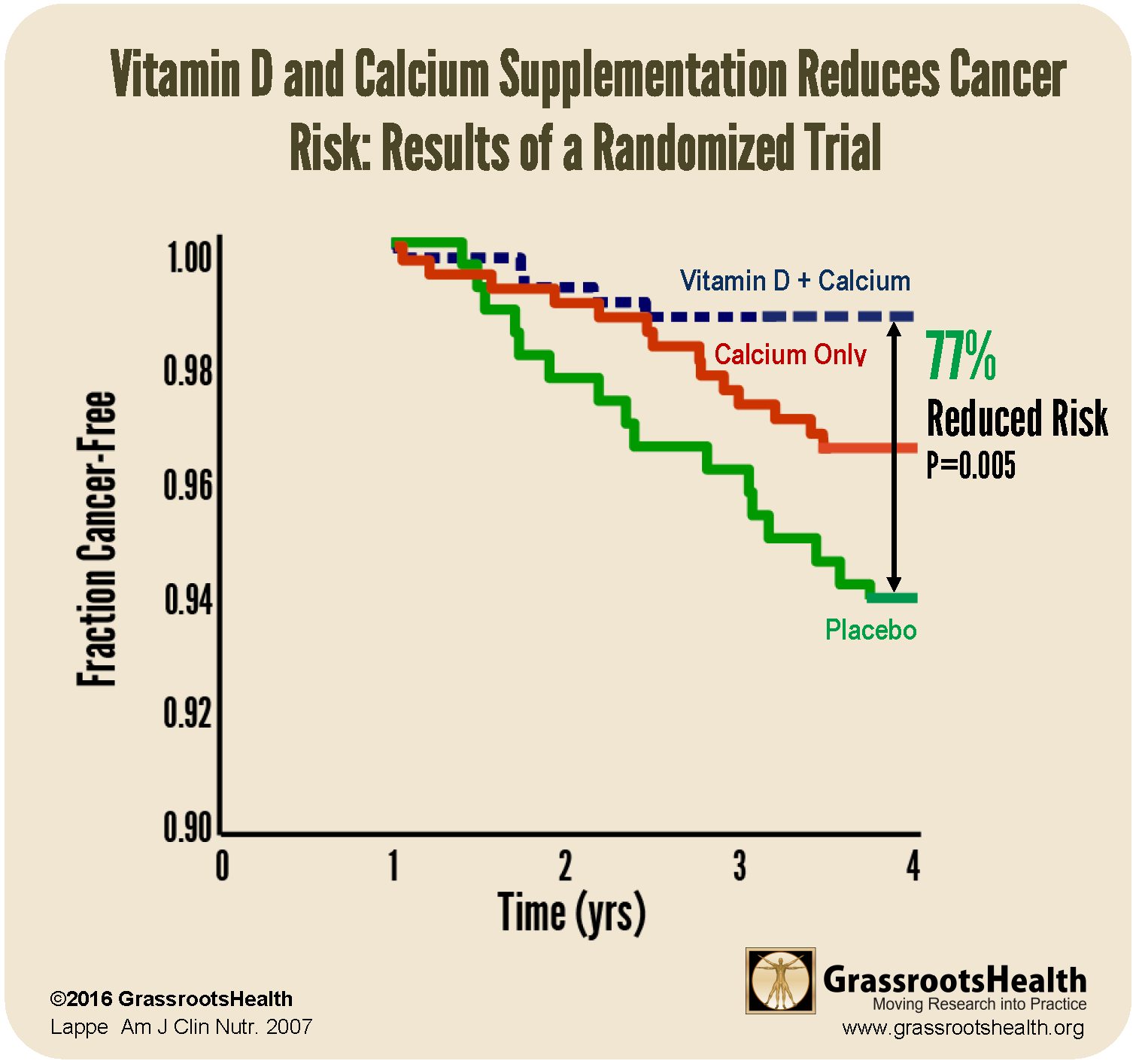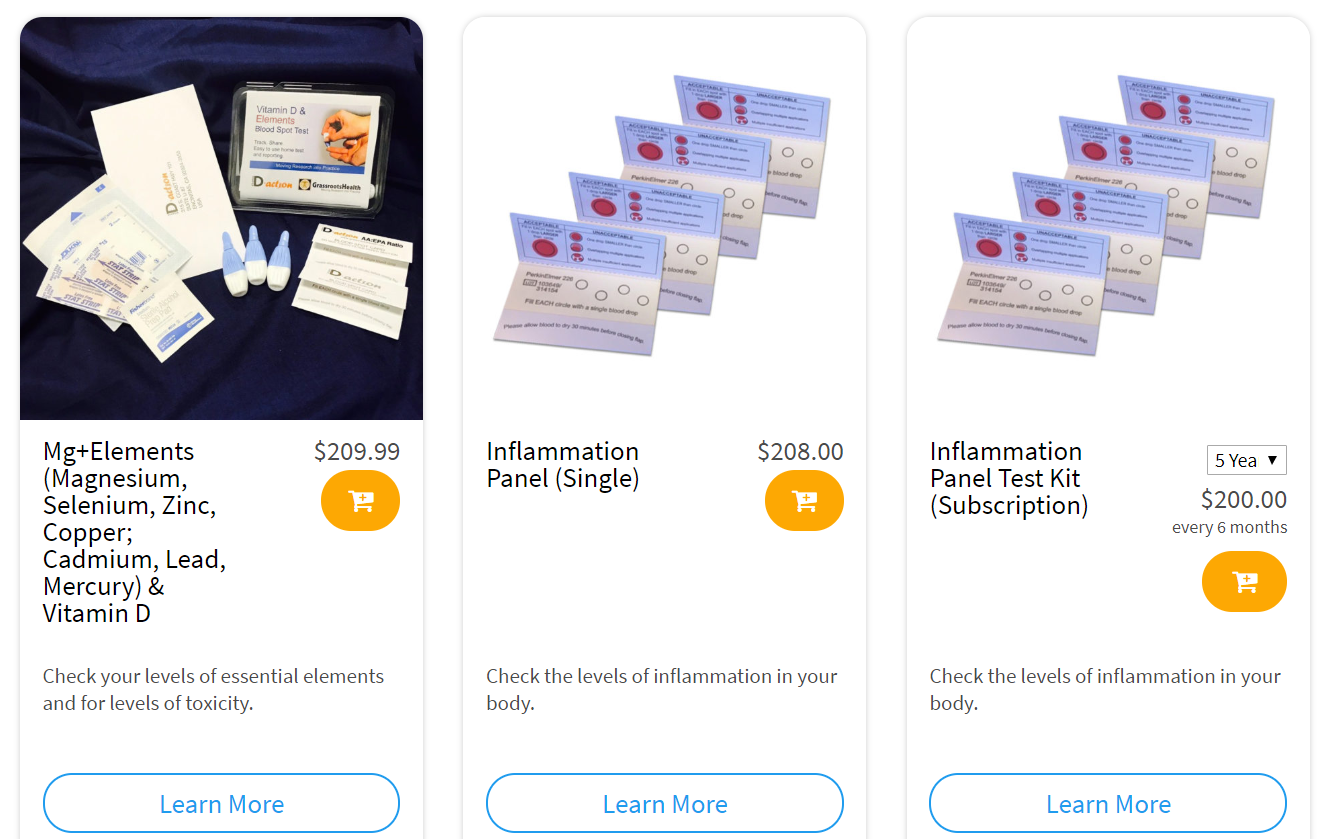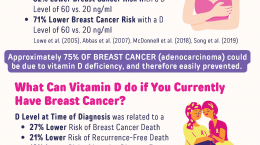Published on October 14, 2019
 October is Breast Cancer Awareness Month, but here at GrassrootsHealth Nutrient Research Institute we prefer to take the opportunity each October to focus on breast cancer prevention. This post is the first of a series with a focus on reducing the incidence of breast cancer. Please share this informational series with all you know who may have or be concerned with getting breast cancer.
October is Breast Cancer Awareness Month, but here at GrassrootsHealth Nutrient Research Institute we prefer to take the opportunity each October to focus on breast cancer prevention. This post is the first of a series with a focus on reducing the incidence of breast cancer. Please share this informational series with all you know who may have or be concerned with getting breast cancer.
Randomized Controlled Trial Shows 77% Lower Cancer Risk
In 2007, Dr. Joan Lappe et al. published Vitamin D and calcium supplementation reduces cancer risk: results of a randomized trial with results from a four year, population-based, double-blind, randomized, placebo-controlled trial, and data from 1179 healthy postmenopausal women, aged 55 or older. The primary outcome of the research was fracture incidence, and the secondary outcome was cancer incidence. The population was white, lived around 41 degrees latitude, and had an average vitamin D level at the start of the trial of 29 ng/ml (72 nmol/L). One group was randomly assigned to receive 1100 IU vitamin D and 1400-1500 mg calcium daily, a second group received calcium and a placebo for vitamin D, and a third received only placebo – no active supplements at all.
An analysis of the data found that for those diagnosed with any non-skin cancer after the first year, there was a 77% lower risk of cancer in the vitamin D and calcium group than placebo alone (P value <0.005). This group had an average vitamin D serum level of 38 ng/ml (96 nmol/L) after one year of treatment.
This was the first intervention trial that showed that vitamin D can reduce overall cancer incidence. Unfortunately, since it was not the primary outcome many in the research community discounted the cancer results of this study.
Join the Study to Help Reduce Breast Cancer Incidence
GrassrootsHealth has since implemented Reduce Breast Cancer NOW! as a field trial using our methodology for moving nutrient research into practice. This model was developed and tested over 7 years, with over 10,000 participants, through the D*action project. All women are welcome to join this project to help demonstrate the effects of vitamin D on breast cancer prevention.
Are you concerned about your vitamin D level and cancer?
Testing your vitamin D level regularly and taking steps to keep it at a target level of 40-60 ng/ml (100-150 nmol/L) is important for all stages of health. Through GrassrootsHealth Nutrient Research Institute, you can also test your omega-3 status, inflammation levels, and levels of essential nutrients and toxins. Find out your levels today! Log on to the shop (click the link below) to get your tests and see for yourself if your level can be improved.
Make sure you track your results before and after, about every 6 months!
Click Here to Access the Shop Page
How can I track my nutrient intake and levels over time?
To help you track your supplement use and nutrient levels, GrassrootsHealth has created an online tracking system called myData-myAnswers. For each specific supplement, you can track what days you take it, how much, and many other details. This will help you know your true supplemental intake and what patterns of use work for you to reach and maintain optimum nutrient levels. Check it out today!








